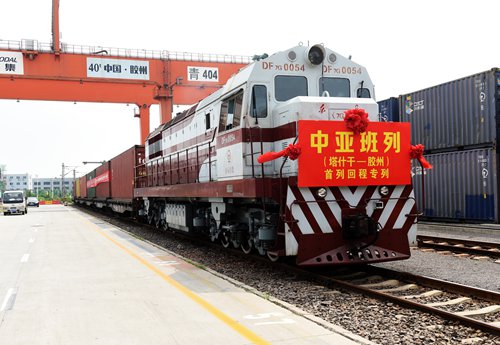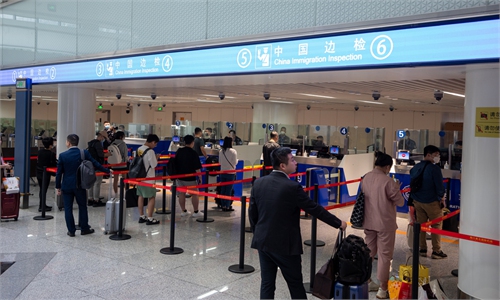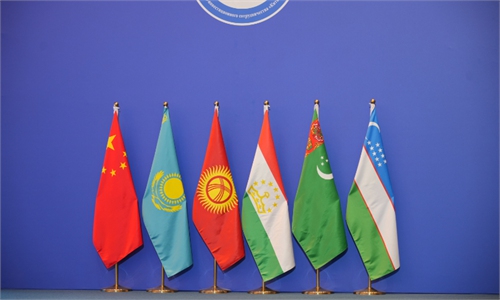China-Central Asia Summit paves way for enhanced trade ties under BRI; agriculture, energy still ballast stones: observers
Companies expect connections in energy, agriculture

A container train arrives at a Jiaozhou railway station in Qingdao, East China's Shandong Province. It was loaded with $3 million worth of cotton yarn from Tashkent, the largest city of Uzbekistan, traveling for 15 days in total. This is the first train to come from Uzbekistan since the railway link between Qingdao and Central Asia opened in 2015. So far, more than 3,000 freight trains have departed from Qingdao to Central Asian countries and regions. Photo: IC
The China-Central Asia Summit - to be held later in May - is expected to further bridge political ties between China and the Central Asian countries, observers said. They said high-level exchanges will lay the groundwork for closer trade connections under the China-proposed Belt and Road Initiative (BRI), which has already borne fruit in the five nations over the past decade.The summit, which is the first major diplomatic event to be held in China this year, will take place in Xi'an, capital of Northwest China's Shaanxi Province on May 18 and 19, the Chinese Foreign Ministry announced on Monday.
Some "important political documents" will be signed at the summit, ministry spokesperson Wang Wenbin disclosed at a routine press conference on Monday.
Central Asia is a significant geopolitical region for China, and the region serves as an important juncture for the BRI initiative, so closer political ties will no doubt enhance the cooperation trade areas under the mechanism, Li Xin, director of the Center for Russian and Central Asia Studies at the Shanghai Institutes for International Studies, told the Global Times on Monday.
Stable ties with the region will also help promote the prosperity of western China, including Northwest China's Xinjiang Uygur Autonomous Region, Li said.
Observers believe that under the BRI, cooperation in agriculture and new energy, the two ballast stones of China's trade with the five Central Asian countries, will continue to expand, and exchanges in e-commerce, the green and digital economy, as well as high technology, may generate new growth points for cooperation.
China has signed cooperation documents on the BRI with all five Central Asian countries, with projects linked with locals' livelihoods already bearing fruit.
One example is Power Construction Corp of China (PowerChina), which has been participating in the planning and construction of energy, power and transportation infrastructure in the region since entering the Central Asian market in 1999.
So far, the company has contracted and developed 56 projects, involving a wide range of categories from hydropower plants and wind power stations to airports and mining, PowerChina told the Global Times on Monday.
Flagship projects include the Zhanatas 100 megawatt Wind Power Plant in Kazakhstan, which is currently the largest wind power project in Central Asia. Since June 2021, its full capacity has been connected to the grid for power generation, producing 350 million kilowatt-hours of electricity per year, which can meet the demand of millions of households and ease pressure on power supply in the south of the country.
"Under the guidance of the BRI, we will continue to actively fulfill social responsibilities and contribute to the economic construction of the Central Asian countries," said the company.
Agricultural cooperation is also gaining speed.
"We have already built a processing plant in Kazakhstan with an annual output of 300,000 tons, and we are aiming to set up two grain assembly centers in the nation this year to further expand purchasing and planting areas in the nation," Liu Dongmeng, vice president of Xi'an Aiju Grain and Oil Industry Group, told the Global Times on Monday.
The Xi'an-based company said it hopes to take the opportunity of the China-Central Asia Summit to expand the scope of agricultural cooperation between China and Kazakhstan, noting that its investment will on the one hand help improve local production and operation management, and on the other stabilize and expand China's import sources for high-quality farm products.
According to China's Commerce Ministry, China's trade with the five Central Asian countries reached a historic high of $70.2 billion in 2022, some 100 times the level three decades earlier.
In 2022, China's imports of agricultural, energy and mineral products from these countries jumped by over 50 percent while its exports of mechanical and electronic products increased by 42 percent.
As of the end of 2022, China's direct investment in the five Central Asian countries had reached nearly $15 billion, with a number of cooperation projects launched in fields such as oil and gas exploration, processing and manufacturing, connectivity and digital technologies.
Trade is set to surge continuously, since cooperation with China - which does not interfere in other countries' internal affairs - will only bring development and co-benefits for the region, Li said.



